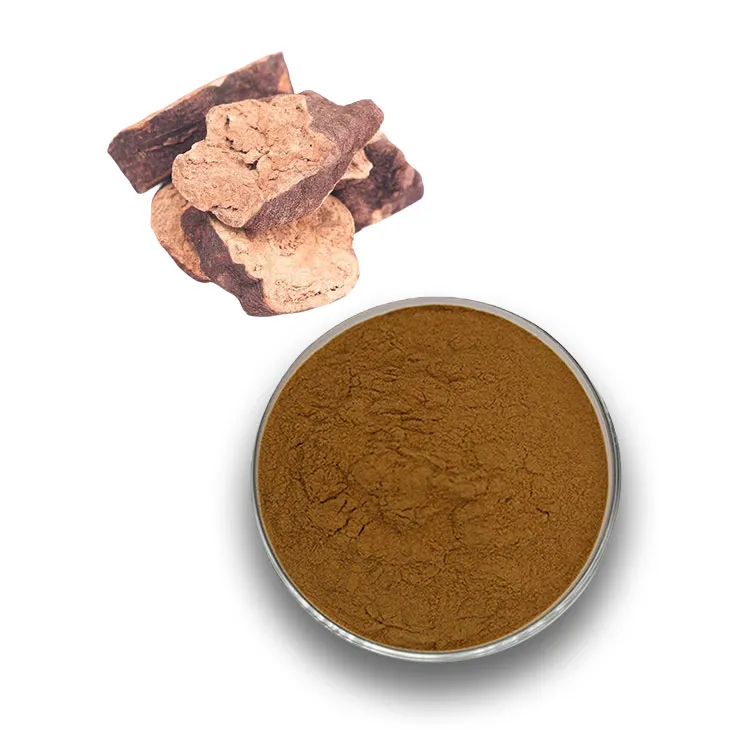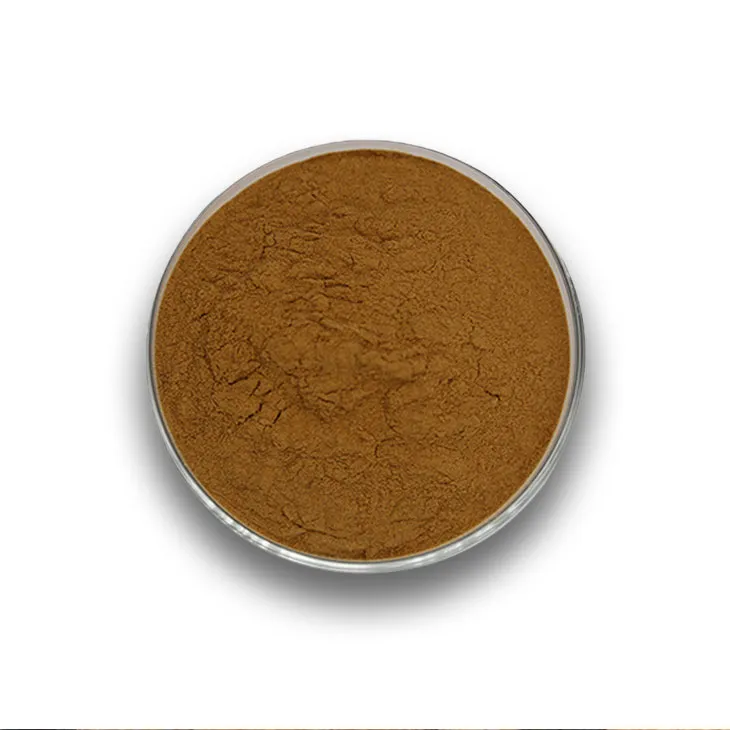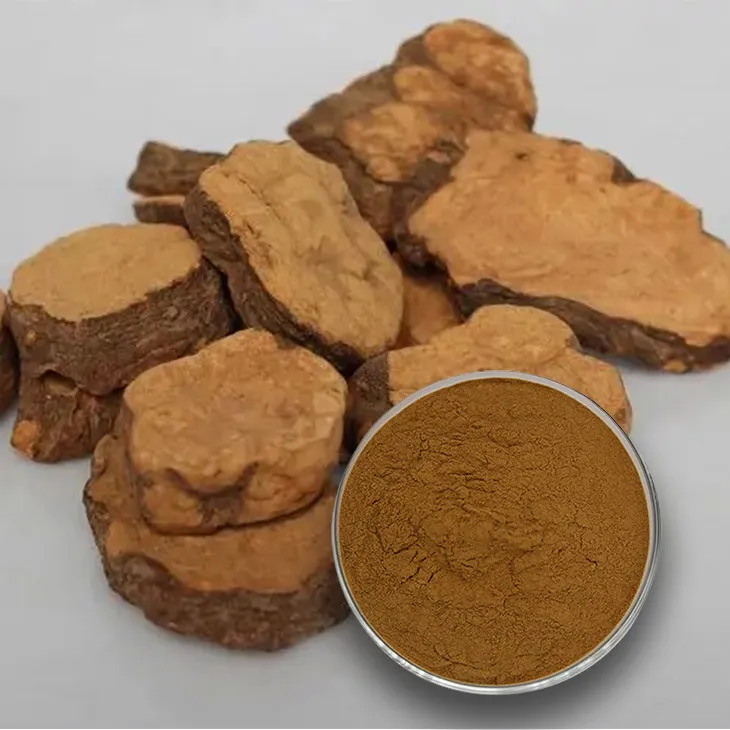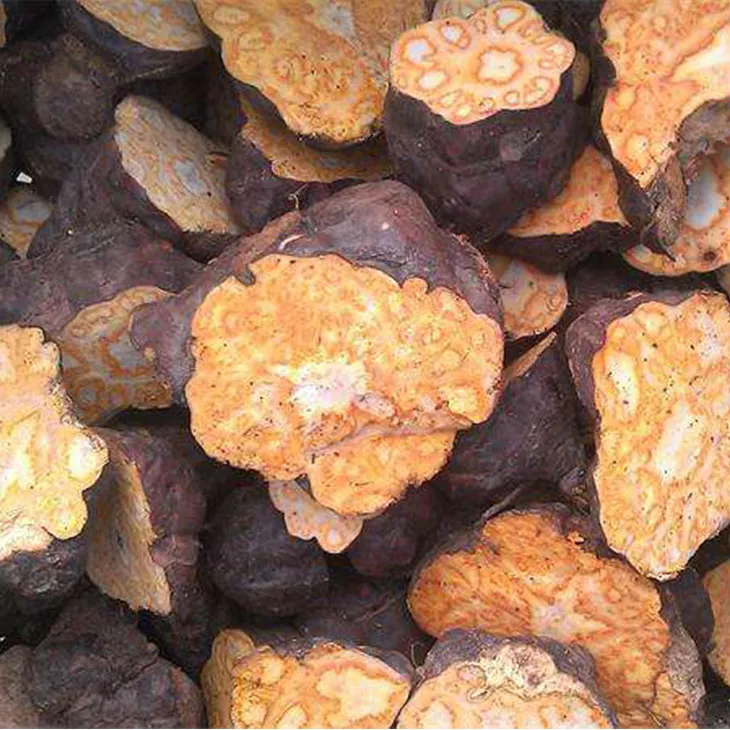- 0086-571-85302990
- sales@greenskybio.com
The taste of mature Polygonum multiflorum and natural Polygonum multiflorum extract.
2024-11-11

1. Introduction
Polygonum multiflorum is a well - known plant in traditional Chinese medicine. It has been used for centuries due to its various potential health benefits. The mature Polygonum multiflorum has a unique taste, and the natural extract of this plant is also of great interest. This article aims to explore the taste of mature Polygonum multiflorum, the extraction of its natural substances, and related aspects such as antioxidant and anti - inflammatory properties, as well as their impact on product development.

2. The Taste of Mature Polygonum multiflorum
The taste of mature Polygonum multiflorum is complex and distinct. It has a slightly bitter taste, which is one of the characteristic features. This bitterness may be attributed to the presence of certain chemical compounds within the plant. Additionally, there is also a hint of earthiness in its taste, which gives it a natural and rustic flavor profile.
When compared to other medicinal plants, the taste of Polygonum multiflorum stands out. For example, it is not as pungent as some herbs, but its bitterness is more pronounced. This unique taste can have both positive and negative impacts on consumer acceptance. Some consumers who are accustomed to traditional herbal tastes may find it acceptable or even desirable, while others may be put off by the bitterness.

3. Natural Polygonum multiflorum extract
3.1 Extraction Methods
There are several methods for extracting natural substances from Polygonum multiflorum. One common method is solvent extraction. Ethanol is often used as a solvent due to its ability to dissolve a wide range of compounds present in the plant. The process involves soaking the dried Polygonum multiflorum in ethanol for a certain period, followed by filtration to obtain the extract.
Another method is water extraction. This is a more traditional approach. The plant material is boiled in water, and the resulting liquid contains the extracted substances. However, water extraction may not be as efficient as solvent extraction in obtaining certain hydrophobic compounds.
3.2 Composition of the Extract
The natural extract of Polygonum multiflorum contains a variety of bioactive compounds. Flavonoids are among the important components. These flavonoids are known for their antioxidant properties. There are also polyphenols present in the extract. These compounds contribute to the overall health - promoting effects of the extract, such as anti - inflammatory activities.
In addition, there are some unique alkaloids in the extract. These alkaloids may play a role in the traditional medicinal uses of Polygonum multiflorum, although their exact mechanisms of action are still being studied.

4. Antioxidant and Anti - inflammatory Properties
4.1 Antioxidant Properties
The antioxidant properties of Polygonum multiflorum extract are significant. The flavonoids and polyphenols present in the extract act as antioxidants. They can scavenge free radicals in the body, which are unstable molecules that can cause damage to cells and tissues. By neutralizing these free radicals, the extract helps to protect the body against oxidative stress.
Studies have shown that the antioxidant activity of Polygonum multiflorum extract can be comparable to that of some well - known antioxidant - rich foods or supplements. This makes it a potential candidate for use in preventing oxidative - related diseases, such as cardiovascular diseases and certain types of cancer.
4.2 Anti - inflammatory Properties
The anti - inflammatory properties of the extract are also notable. The bioactive compounds in the extract can modulate the body's inflammatory response. They can inhibit the production of pro - inflammatory cytokines, which are signaling molecules that promote inflammation.
For example, in in - vitro studies, Polygonum multiflorum extract has been shown to reduce the expression of inflammatory markers in cells exposed to inflammatory stimuli. This anti - inflammatory effect may have implications for the treatment of inflammatory diseases, such as arthritis.

5. Processing and Utilization
5.1 Processing of the Extract
After extraction, the Polygonum multiflorum extract often needs to be further processed. One important step is purification. This can be achieved through various techniques such as chromatography. Purification helps to remove impurities and increase the concentration of the desired bioactive compounds.
Another aspect of processing is concentration. The extract may be concentrated to a certain degree to make it more suitable for different applications. For example, in the production of dietary supplements, a concentrated extract can be encapsulated more easily.
5.2 Utilization in Different Products
Polygonum multiflorum extract can be used in a variety of products. In the field of dietary supplements, it can be formulated into capsules or tablets. These products are often marketed for their potential health benefits, such as antioxidant and anti - inflammatory support.
In cosmetics, the extract can be incorporated into creams, lotions, and serums. The antioxidant properties of the extract can help to protect the skin from environmental damage, while the anti - inflammatory properties may be beneficial for skin conditions such as acne or eczema.
There is also potential for its use in functional foods. For example, it could be added to energy bars or drinks to provide additional health benefits.
6. Impact of Taste on Consumer Acceptance
The taste of mature Polygonum multiflorum can significantly influence consumer acceptance of products containing it. As mentioned earlier, the bitterness can be a deterrent for some consumers. In the case of dietary supplements, if the taste is too strong, it may be difficult for consumers to adhere to the recommended dosage.
However, there are ways to mitigate the impact of taste. In the production of supplements, flavorings can be added to mask the bitterness. For example, adding natural fruit flavors can make the product more palatable. In the case of functional foods, the taste can be adjusted by combining Polygonum multiflorum with other ingredients that have complementary tastes.
Consumer education also plays a role. If consumers are aware of the potential health benefits of Polygonum multiflorum, they may be more willing to tolerate the taste.
7. Development of Related Products
The development of products related to Polygonum multiflorum is an area of continuous growth. With increasing interest in natural health products, there is a growing market for products containing Polygonum multiflorum extract.
Research and development efforts are focused on improving the extraction methods to obtain higher - quality extracts with more potent bioactive compounds. There is also a trend towards developing novel product formulations, such as combination products that include Polygonum multiflorum extract with other complementary herbs or nutrients.
However, regulatory compliance is also crucial in the development of these products. As Polygonum multiflorum is a medicinal plant, strict regulations need to be followed to ensure the safety and efficacy of the products.
8. Conclusion
In conclusion, the taste of mature Polygonum multiflorum is unique, and its natural extract has significant antioxidant and anti - inflammatory properties. The extraction methods, composition, and utilization of the extract are important aspects to consider. The taste can have an impact on consumer acceptance, but there are ways to address this issue. The development of related products shows great potential, but regulatory compliance must be ensured. Overall, further research and development in this area are likely to lead to more innovative products and a better understanding of the potential of Polygonum multiflorum.
FAQ:
Question 1: What is the taste of mature Polygonum multiflorum?
The taste of mature Polygonum multiflorum is often described as slightly bitter and astringent. This taste is due to the presence of various chemical components in it.
Question 2: How is the natural Polygonum multiflorum extract obtained?
The extraction of natural Polygonum multiflorum extract usually involves processes such as solvent extraction. Appropriate solvents are used to dissolve and separate the active substances from the plant material. Then, through purification and concentration steps, the final extract is obtained.
Question 3: What are the antioxidant properties of mature Polygonum multiflorum and its extract?
Mature Polygonum multiflorum and its extract contain substances such as phenolic compounds. These substances can scavenge free radicals in the body, thereby showing antioxidant properties. They can help protect cells from oxidative damage and play a role in preventing various diseases related to oxidative stress.
Question 4: How do the anti - inflammatory properties of Polygonum multiflorum work?
Polygonum multiflorum may exert anti - inflammatory effects through modulating the immune response and inhibiting the production of inflammatory mediators. Its active components can interact with cells in the immune system to reduce inflammation at the molecular level.
Question 5: How does the taste of Polygonum multiflorum affect consumer acceptance of related products?
The bitter and astringent taste of Polygonum multiflorum can be a challenge for consumer acceptance. However, through proper product formulation, such as adding flavor - masking agents or formulating it into more palatable forms like capsules or tinctures, the acceptance can be improved.
Question 6: How are mature Polygonum multiflorum and its extract processed for different product applications?
For different product applications, different processing methods are used. For example, in the production of health supplements, it may be further purified and combined with other ingredients. In traditional Chinese medicine preparations, it may be processed according to specific traditional methods to enhance its efficacy and safety.
Related literature
- Antioxidant Activity of Polygonum multiflorum Extract: A Review"
- "The Anti - inflammatory Mechanisms of Polygonum multiflorum: Current Research"
- "Processing and Utilization of Polygonum multiflorum in the Food and Pharmaceutical Industries"
- ▶ Hesperidin
- ▶ citrus bioflavonoids
- ▶ plant extract
- ▶ lycopene
- ▶ Diosmin
- ▶ Grape seed extract
- ▶ Sea buckthorn Juice Powder
- ▶ Beetroot powder
- ▶ Hops Extract
- ▶ Artichoke Extract
- ▶ Reishi mushroom extract
- ▶ Astaxanthin
- ▶ Green Tea Extract
- ▶ Curcumin Extract
- ▶ Horse Chestnut Extract
- ▶ Other Problems
- ▶ Boswellia Serrata Extract
- ▶ Resveratrol Extract
- ▶ Marigold Extract
- ▶ Grape Leaf Extract
- ▶ blog3
-
Cranberry Plants and Skin - care Products.
2024-11-11
-
Maca Extract
2024-11-11
-
Troxerutin
2024-11-11
-
Tongkat Ali Extract Powder
2024-11-11
-
Coix Seed Extract
2024-11-11
-
Peppermint Extract Powder
2024-11-11
-
Clove Powder
2024-11-11
-
Shikone Extract
2024-11-11
-
Cocoa Extract
2024-11-11
-
Medicinal Marshmallow Extract
2024-11-11
-
Dan Shen Root Extract/Salvia Root Extract
2024-11-11





















